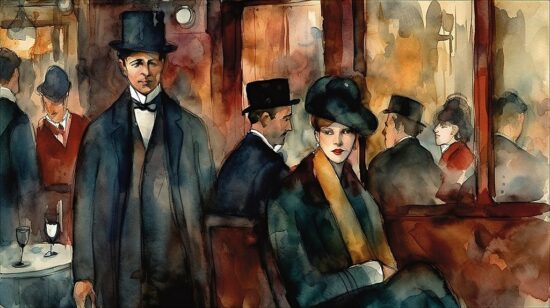Plot and Storyline
Mansfield Park, written by Jane Austen and published in 1814, is a novel that revolves around the life of Fanny Price, a young girl from a poor family who is sent to live with her wealthy relatives at Mansfield Park. The novel explores themes of social class, morality, love, and the role of women in society.
The story begins with Fanny’s arrival at Mansfield Park as a timid and shy ten-year-old. Her wealthy uncle Sir Thomas Bertram and Aunt Norris take her in. Fanny’s cousins, Tom, Edmund, Maria, and Julia, make up the rest of the Bertram family. Fanny’s position in the household is one of dependence and servitude, often treated as inferior to her cousins.
As Fanny grows older, she develops a deep affection for Edmund, the second son of the Bertram family. However, Edmund becomes infatuated with Mary Crawford, a charming and vivacious young woman who has recently moved to the neighborhood. Fanny’s quiet and reserved nature contrasts with Mary’s more outgoing personality, leading to a series of conflicts and misunderstandings.
Meanwhile, Fanny’s other cousins, Maria and Julia, become entangled in their own romantic affairs. Maria becomes engaged to the wealthy and eligible Henry Crawford, while Julia elopes with Mr. Yates, a family friend. These events further complicate the relationships within the household and test the moral values of the characters.
Throughout the novel, Fanny remains a moral compass, often displaying integrity and virtue in the face of various temptations and challenges. She serves as a contrast to the more superficial and morally questionable characters around her.
The story takes a dramatic turn when Maria, already married to Mr. Rushworth, has an affair with Henry Crawford, resulting in scandal and disgrace. This event shakes the foundations of Mansfield Park and leads to a reevaluation of values and priorities.
In the end, Fanny’s steadfastness and moral character are rewarded when Edmund realizes his true feelings for her and they eventually marry. The novel concludes with a sense of resolution and the restoration of order at Mansfield Park.
Characters:
Fanny Price is the central character of Mansfield Park. She is portrayed as a gentle and virtuous young woman who remains true to her principles despite the challenges she faces. Fanny’s moral strength and resilience make her a compelling character, and her journey from a marginalized position in the household to finding love and acceptance is a central theme of the novel.
Edmund Bertram, Fanny’s cousin, is initially infatuated with Mary Crawford but eventually realizes his deep affection for Fanny. Edmund is portrayed as a good-hearted and principled character, although he is not without flaws. His growth and development throughout the novel parallel Fanny’s journey.
Mary Crawford is an intriguing and complex character who represents the allure of wealth and social status. She is initially attracted to Edmund but becomes entangled in a web of manipulation and deceit. Mary’s character serves as a contrast to Fanny, highlighting the differences in their values and priorities.
Sir Thomas Bertram, Fanny’s uncle, is a stern and authoritative figure. He embodies the social and patriarchal norms of the time and plays a significant role in shaping the events of the novel. Sir Thomas’ strict moral code is challenged when his own daughters, Maria and Julia, succumb to scandalous behavior.
Themes and Symbols:
Mansfield Park explores several themes that are central to Austen’s works. One of the predominant themes is social class and its impact on individual lives. Fanny’s position as a poor relation in a wealthy household highlights the inequalities and prejudices of the time. The novel also delves into the theme of morality, contrasting the virtuousness of characters like Fanny and Edmund with the moral compromises made by others.
Love and marriage are recurring themes in Austen’s novels, and Mansfield Park is no exception. The novel examines the nature of romantic relationships and the consequences of making choices based on social status or personal gain. The contrast between Fanny’s love for Edmund, which is rooted in genuine affection, and Maria’s scandalous affair with Henry Crawford underscores the importance of true love and emotional connection.
Symbols are not as prominent in Mansfield Park compared to some of Austen’s other works. However, the symbol of the country estate itself, Mansfield Park, represents stability, tradition, and the social order. The events that unfold within the estate challenge and disrupt this order, reflecting the changing values and attitudes of the time.
Writing Style:
Jane Austen’s writing style in Mansfield Park is characterized by her keen observation of social interactions, sharp wit, and ironic commentary. Her prose is elegant and precise, reflecting the manners and decorum of the time. Austen’s use of free indirect discourse allows readers to gain insights into the thoughts and feelings of the characters, adding depth and complexity to their portrayal.
Austen employs various literary techniques throughout the novel, includingirony, satire, and social commentary. She skillfully exposes the hypocrisy and superficiality of certain characters and societal norms. For example, the character of Mrs. Norris, Aunt Norris, serves as a satirical representation of self-centeredness and greed.
The narrative structure of Mansfield Park is linear, following a chronological sequence of events. Austen presents the story from a third-person omniscient perspective, allowing readers to gain a comprehensive understanding of the characters’ thoughts and motivations.
Setting and Atmosphere:
The setting of Mansfield Park plays a significant role in shaping the atmosphere and tone of the novel. The estate itself, with its grandeur and opulence, creates a sense of privilege and entitlement. The sprawling grounds and formal drawing rooms provide a backdrop for the intricate social dynamics and power struggles among the characters.
The rural countryside setting also serves as a contrast to the city and represents a more traditional and idyllic way of life. The natural beauty of the surroundings and the slower pace of rural living contribute to the overall atmosphere of tranquility and reflection.
Historical, Social, or Political Context:
Mansfield Park is set in the early 19th century, a time when social class and gender roles were highly restrictive. The novel reflects the social norms and expectations of the period. It explores the limitations placed on women, particularly those from lower social classes, and the challenges they faced in navigating the marriage market.
The historical context of Mansfield Park also intersects with the abolitionist movement in England. Sir Thomas Bertram’s wealth and status are partly derived from his ownership of a plantation in Antigua, which raises questions about the morality of slavery. Austen subtly critiques the practice of slavery through her portrayal of the Bertram family’s wealth and the implications it has on their lives.
Impact and Reception:
Upon its publication, Mansfield Park received mixed reviews from critics and readers. Some found the novel’s moralistic tone and the reserved nature of its heroine, Fanny Price, less engaging compared to Austen’s more popular works like Pride and Prejudice and Sense and Sensibility. However, over time, Mansfield Park has gained recognition for its complex character development and exploration of moral dilemmas.
The novel’s impact on literature is significant, as it continues to be studied and analyzed for its social commentary and exploration of themes. It offers valuable insights into the societal norms and values of the Regency era and provides a nuanced portrayal of the complexities of human relationships.
What are some examples of the author’s use of irony in Mansfield Park?
Jane Austen’s use of irony is prevalent throughout Mansfield Park. Here are a few examples:
1. Irony in Fanny’s Position: One of the central ironies in the novel is Fanny Price’s position in the Bertram household. Despite being a member of the family, she is treated as an inferior and is often reminded of her lower social status. This irony is heightened by the fact that Fanny possesses greater moral integrity and strength of character than many of her wealthier relatives.
2. Irony in Mrs. Norris’s “Kindness”: Mrs. Norris, Fanny’s Aunt, often claims to be acting out of kindness and concern for Fanny’s well-being. However, her actions consistently reveal her selfish and manipulative nature. For example, she convinces Fanny to accept an invitation to visit her family, but only to relieve herself of the burden of Fanny’s presence at Mansfield Park.
3. Irony in Mary Crawford’s Morality: Mary Crawford presents herself as a woman of strong moral values, yet her actions and attitudes often contradict her claims. She criticizes Fanny for her moral steadfastness, considering her own pursuit of wealth and social status as more important. This ironic contrast between Mary’s professed morals and her actual behavior highlights the hypocrisy and superficiality of certain characters.
4. Irony in the Scandal of Maria and Henry: The affair between Maria Bertram and Henry Crawford is a source of scandal and disgrace within the novel. This ironic twist exposes the characters’ moral failings and the repercussions of their actions. It also serves as a critique of the societal expectations placed on women and the consequences of pursuing superficial desires.
5. Irony in Sir Thomas’s Absence: When Sir Thomas Bertram leaves for Antigua to attend to his plantation, he entrusts the moral guidance of his family to Mrs. Norris. However, it is under her watch that the moral fabric of the household unravels, leading to the scandalous events involving Maria and Henry. This irony highlights the shortcomings of the authority figures and their inability to uphold the values they espouse.
These examples demonstrate Austen’s skillful use of irony to critique societal norms, expose hypocrisy, and add depth to the characterization in Mansfield Park.
In conclusion, Mansfield Park is a thought-provoking novel that delves into themes of social class, morality, love, and the role of women in society. Jane Austen’s writing style and keen observations of human nature contribute to the depth and richness of the story. The novel’s enduring impact and continued relevance attest to its status as a significant work in Austen’s literary canon.
Sources:
Mansfield Park | Romantic Comedy, Satire, Social Critique | Britannica
Mansfield Park | Romantic Comedy, Satire, Social Critique | Britannica






